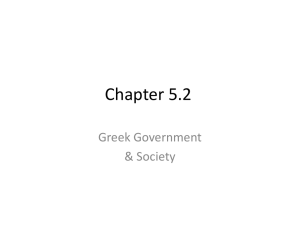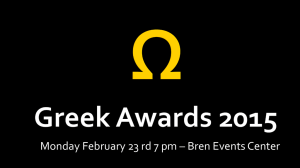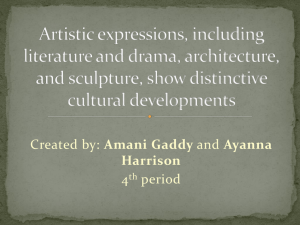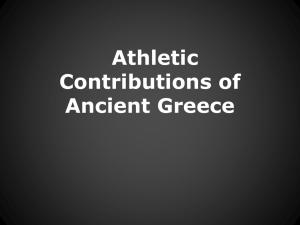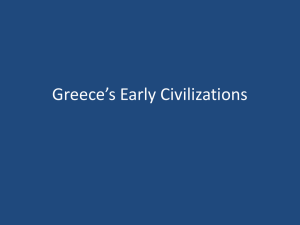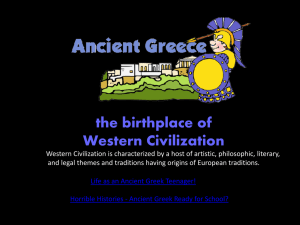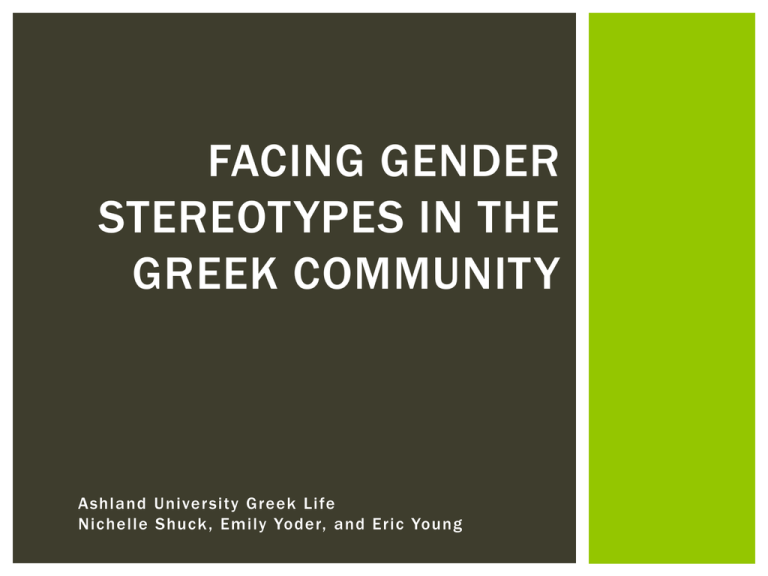
FACING GENDER
STEREOTYPES IN THE
GREEK COMMUNITY
Ashland Univer sity Greek Life
Nichelle Shuck , Emily Yoder, and Eric Young
INTRODUCTIONS
Nichelle Shuck – Alpha Phi (Ashland University)
Emily Yoder – Alpha Delta Pi
(University of Mount Union)
Eric Young - Alpha Tau Omega (Bowling Green)
PRESENTATION GOALS
To help AU Greek students have a better understanding of:
Gender roles, stereotypes, and expectations played out in
society
How the media helps support these stereotypes
How Greek Life (fraternities and sororities) can create “hyper
masculine” and “hyper feminine” environments that can
perpetuate gender stereotypes.
Why Greek member should care and take action (individually,
chapter-wide, and campus wide) to break down these gender
stereotypes
WARNING! IT’S JUST A SKIT
• Suicide is currently the second most common cause of death among college
students
• Males account for 5 to 10 percent of bulimia and anorexia cases.
• 40% of college students admit to knowing about hazing activities
• 29% of Greek leaders are concerned with the overuse of alcohol during
pledge activities
• About 3% of American men — or 1 in 33 — have experienced an attempted or
completed rape in their lifetime.
DEFINING GENDER
a set of two or more grammatical categories into which the
nouns of certain languages are divided, sometimes but not
necessarily corresponding to the sex of the referent when
animate.
any of the categories, such as masculine, feminine, neuter, or
common, within such a set
informal: the state of being male, female, or neuter
informal: all the member of one sex – the female gender.
C o l l i n s E n g l i s h D i c t io n a r y – C o m p l ete a n d u n a b r i d g e d 1 0 t h e d i t i o n . ( 2 01 2 , M a r c h 1 1 ) .
R et r i eve d f r o m h t t p : / / d i c t io n a r y.r e fe r e n c e .c o m / b r ows e / G e n d e r.
DEFINING GENDER - MEDICALLY
The sex of an individual, male or female, based on reproductive
anatomy.
Sexual identity, especially in relation to society or culture.
T h e A m e r i c a n H e r i t a g e – S te d m a n ’s M e d i c a l D i c t i o n a r y. ( 2 01 2 , M a r c h 1 1 ) . Ret r i ev e d
f r o m h t t p : / / d ic t i o n ar y. r efe r e n c e .c o m / b row s e / G en d er.
DEFINING GENDER - CULTURALLY
A grammatical category indicating the sex, or lack of sex, of
nouns and pronouns.
The three genders are masculine, feminine, and neuter. He is a
masculine pronoun; She is a feminine pronoun; it is a neuter
pronoun.
Nouns are classified by gender according to the gender of the
pronoun that can substitute for them.
In English, gender is directly indicated only by pronouns.
T h e A m e r i c a n H e r i t a g e – N ew D i c t io n a r y o f C u l t ur a l L i te r a c y, 3 r d E d i t i o n . ( 2 01 2 , M a r c h
1 1 ) . Ret r i ev e d f r o m h t t p : / / d i ct i o n a r y. r e fe r e n c e .c o m/ b row s e / G e n d e r.
LEV’S CONCEPTUALIZATION OF BINARY SYSTEMS OF
SEX, GENDER IDENTIT Y, GENDER ROLE, AND SEXUAL
ORIENTATION
Evans, N. J., Forney, D. S., Guido, F. M., Patton, L. D., & Renn, K. A. (2010). Student development in college: theory,
research, and practice. (2nd ed.). San Francisco, CA: Jossey-Bass A Wiley Imprint.
LEV’S RELATIONSHIP AMONG SEC, GENDER,
GENDER ROLE, AND SEXUAL ORIENTATION
WHENALL ARE FLUID AND ON A CONTINUUM
Evans, N. J., Forney, D. S., Guido, F. M., Patton, L. D., & Renn, K. A. (2010). Student development in college: theory,
research, and practice. (2nd ed.). San Francisco, CA: Jossey-Bass A Wiley Imprint.
GENDER STEREOT YPES - FEMALE
GENDER STEREOT YPES - MALE
BRIEFLY TOUCH ON
GENDER ROLE IN THE MEDIA
MT V PSA – SLUT
MT V PSA – GAY
GENDER IN THE MEDIA
MissRepresentation
GREEK GENDER IN THE MEDIA
Male focus – Beta House
Female focus – Sorority Row
GREEK GENDER ROLES
Each group will get “What People Think I Do” Stereotype
Your Group has and have 5 -8 minutes to fill-out the each
square
Discuss the following questions:
How does what society think about Greek Life support gender
stereotypes?
How does what society think about Greek Life and gender roles affect
you, your chapter, and the AU Greek community?
Stereotypes – What People Think I Do Activity
RESEARCH BASED RESULTS OF
STEREOT YPES PLAYED OUT IN GREEK LIFE
COMMUNITIES
Drout and Corsoro - Greek organization members were more
likely to put the blame of hazing incidents on the system
rather than to look at it as individual choices (2003).
“Research shows that members of college fraternities and
sororities drink more heavily and typically suf fer more alcohol
related consequences than other students…” (Fairlie, DeJong,
Stevenson, Lavigne, & Wood, 2010, p. 87)
Students who joined Greek organizations their first semester
of college had a lower grade point average than those who did
not (Debard, Lake, & Binder, 2006).
TAKE ACTION – OPENING SKIT
A brother of an AU fraternity recently chose to
deactivate due to the harsh words that brothers would
use to describe other brothers and women, specifically
sorority women. His brothers could not understand why
this mattered so much to him but that’s because they
didn’t know his past. When he would bring this up to
his brothers, the bullying would only intensify and he
would be harassed even more. The brothers didn’t
understand what the big deal was and figured he knew
they were only joking. However, If only the bothers
would of understood how close the ex -member was to
taking his own life because he couldn’t take the words
they used to address him and the way they treated
him.
TAKE ACTION - GROUP SCENARIO
How would you address YOUR SPECIFIC AUDIENCE
How would you respond to the situation when addressing the
specific audience ?
What resources (campus and community) do you know of ?
How would this affect your chapter ?
How would this affect the AU Greek community?
LET’S GO BACK TO OUR SHARED VALUES
D e l t a Z et a - To t h e wo rl d, I pro m i se te m pe ra nc e a n d insight a n d courage , To
crusade for justice , To s e e k t h e t rut h a n d de fe n d i t a l way s; To t h o s e w h o m
my l i fe m ay to uc h i n s l ig ht m e a sure…
P h i M u - To ke e p o ur l i ves g e n t le, m e rc i ful a n d j us t , Thus being true to the
womanhood of love . To wa l k i n t h e way o f h o n o r, g ua rdi n g t h e puri t y o f o ur
t h o ug h t s a n d de e ds . Being steadfast in ever y duty small or large …
Al ph a P h i - I be l i eve i n i t a s a s h rin e o f i n te rn at ion al s i ste rh ood w h e re in I m ay
fi n d l ove a n d l oya lt y, s y m pat hy a n d un de r s t an din g, i n s pirat ion a n d o ppo r t un i t y. I
be l i eve i n i t a s a creator of good citizenship , h e l ping m e to do my wo rk
we l l , to live in harmony with others …
Al ph a D e l t a P i - I B E LIE V E t h a t o ur m ot to , “ We Live For Each Other , ”
ex pre s ses t h e t rue s pi rit o f fra te rn i t y … I B E LIE V E t h a t t h e pri v ilege o f
m e m ber ship i n Al ph a D e l t a P i bri n g s t h e re s po n sibilit y to do my be s t i n w h a tever
I un de r t a ke , a l way s re m e m bering t h a t leadership requires confidence
tempered with humility and courage blended with tolerance . . .
LET’S GO BACK TO OUR SHARED VALUES
Tau Kappa Epsilon- To Believe in the life based upon integrity,
justice, sincerity, patience, moderation, culture, and challenge in
order to serve as a responsible, mature member of society…
Phi Delta Theta – Phi Delta Theta was organized with three
principle objectives: The cultivation of friendship among its
members, the acquirement individually of a high degree of mental
culture, and the attainment personally of a high standard of
morality.
Phi Kappa Psi - I believe that I am honor bound to strengthen my
character and deepen my integrity; to counsel and guide my
Brothers who stray from their obligations; to respect and emulate
my Brothers who practice moderation in their manners and morals
ACTION STARTS WITH YOU
REFERENCES
D e B a r d , R . , L a k e , T. , & B i n d e r, R . S . ( 2 0 0 6 ) . G r e e k s a n d g r a d e s : T h e F i r s t - Ye a r E x p e r i e n c e .
N A S PA J o u r n a l , 4 3 ( 1 ) , 5 6 - 6 8 . R e t r i e v e d f r o m : h t t p : / / w w w. n a s p a . o r g
Drout, C. E., & Corsoro, C. L. (2003). Attitudes toward fraternity hazing among fraternity members,
sorority members, and non-Greek students. Social Behavior & Personality: An
I n t e r n a t i o n a l J o u r n a l , 3 1 , 5 3 5 - 5 4 3 . R e t r i e v e d f r o m : h t t p : / / w w w. s b p - j o u r n a l . c o m /
F a i r l i e , A . M . , D e J o h n g , W. , S t e v e n s o n , J , F. , L a v i g n e , A . M . , & Wo o d , M . D . ( 2 0 1 0 ) . F r a t e r n i t y a n d
sorority leaders and members: A comparison of alcohol use, attitudes, and policy
awareness. American
Journal of Drug and Alcohol Abuse, 36, 187-193. doi:
10.3109/00952990.2010.491878
CONTACT INFORMATION
Nichelle Shuck, CWRU Greek Life Assistant for Leadership
nshuck@kent.edu
Emily Yoder, CWRU Greek Life Assistant for Ritual
eyoder9@kent.edu
Eric Young, Resident Director; Graduate Assistant in the Of fice
of Alcohol, Drug, and Wellness Education
younger@mountunion.edu
@EricRYoung

